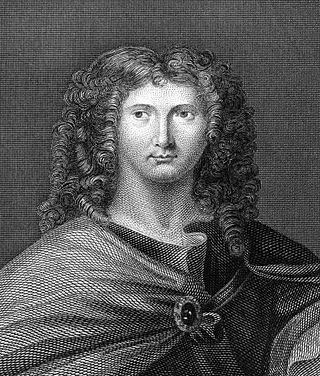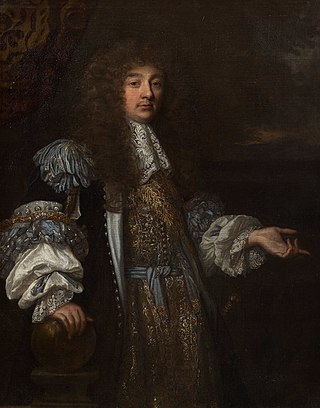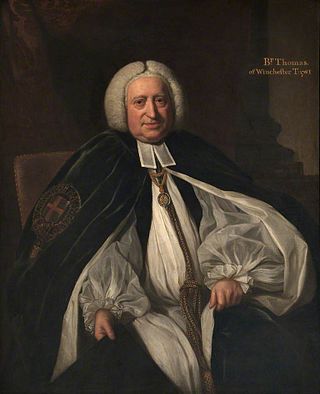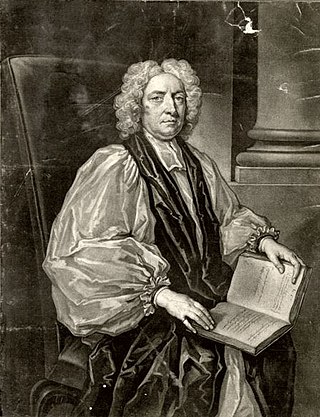Knightly Chetwood (also Knightley Chetwood) (born Chetwode, 1650; died Tempsford, 1720) was an Anglican priest, [1] poet, and translator. [2]
Knightly Chetwood (also Knightley Chetwood) (born Chetwode, 1650; died Tempsford, 1720) was an Anglican priest, [1] poet, and translator. [2]
Chetwood was the eldest son of Valentine Chetwood of Chetwood, Buckinghamshire and his wife Mary Shute, daughter of Francis Shute of Upton, Leicestershire. His younger brother Benjamin Chetwood moved to Ireland, where he sat in the Irish House of Commons, and made an advantageous marriage to one of the co-heiresses of the Eustace family of Harristown, Naas South.
He was baptised on 29 October 1650. He was educated at Eton and King's College, Cambridge. He was ordained a priest in London on 4 March 1683.
He held the living at Great Rissington. He became Archdeacon of York [3] on 10 January 1689.
He was the Dean of Gloucester from 1707 [4] until his death on 4 April 1720. [5]
Chetwood's works are: [2]
He also edited the Traitté touchant l'Obeissance Passive, Lond. (1685), translated by the Earl of Roscommon from the English of William Sherlock. [2]
Chetwood married a daughter of Samuel Shute, sheriff of London, and left a son and a daughter, both of whom died unmarried. The son, Dr. John Chetwood, fellow of Trinity Hall, Cambridge, died on 17 February 1752. His will dated 25 Sept. 1733, gave to Wadham Knatchbull, a fellow of the college, a legacy, a locket of Lord Roscommon's hair, and his books, with his late father's manuscript sermons, requesting that Knatchbull, by his will, would order them to be destroyed. Chetwood had a claim, vainly prosecuted by his son, to the ancient English barony of Wahull. [2]

Richard Sterne was a Church of England priest, Archbishop of York from 1664 to 1683.

William Walsh of Abberley Hall, Worcestershire was an English poet and critic and a Whig politician who sat in the English and British House of Commons from 1698 to 1708.

Earl of Roscommon was a title in the Peerage of Ireland. It was created on 5 August 1622 for James Dillon, 1st Baron Dillon. He had already been created Baron Dillon on 24 January 1619, also in the Peerage of Ireland. The fourth Earl was a courtier, poet and critic. The fifth Earl was a professional soldier, politician and courtier: he was friendly with Samuel Pepys, who refers to him several times as "Colonel Dillon" in his famous Diary. After the death of the tenth Earl, there were two prolonged investigations by the Irish House of Lords during the 1790s to ascertain the legitimacy of his son Patrick, against the rival claim by Robert Dillon, a descendant of the seventh son of the first Earl and the next male heir in line. These eventually found in Patrick's favour. The titles became dormant on the death of the eleventh Earl in 1816. However, in 1828 the United Kingdom House of Lords decided that the rightful heir to the peerages was Michael Dillon, another descendant of the seventh son of the first Earl, who became the twelfth Earl. The House of Lords decided against Francis Stephen Dillon, an inmate of a debtors' prison who dubiously claimed descent from the third son of the first Earl. The titles became extinct on the death of the twelfth Earl on 15 May 1850.

Wentworth Dillon, 4th Earl of Roscommon (1637–1685), was an Anglo-Irish landlord, Irish peer, and poet.
Richard Duke was an English clergyman and poet, associated with the Tory writers of the Restoration era.
David Wilkins (1685–1745), originally named Wilke or Wilkius, was a Prussian orientalist, born in Memel, who settled in England. His 1716 publication of the Coptic New Testament was the editio princeps.
Geoffrey de Burgh was a medieval English cleric who was Archdeacon of Norwich (1200–1225), Bishop of Ely and the brother of William de Burgh and Hubert de Burgh, 1st Earl of Kent.
Nationality words link to articles with information on the nation's poetry or literature.
William Langton was a medieval English priest and nephew of Archbishop Walter de Gray. William was selected but never consecrated as Archbishop of York and Bishop of Carlisle.
Reginald Boulers was a medieval Abbot of Gloucester, Bishop of Hereford and Bishop of Coventry and Lichfield.
William Guise (c.1653–1683), was an English orientalist.

John Thomas was an English bishop.

Edward Smallwell (c.1720–1799) was an English bishop of St David's and bishop of Oxford.

John Waugh (1656–1734) was an English clergyman, bishop of Carlisle from 1723.
Carey or Cary Dillon, 5th Earl of Roscommon, PC (Ire) (1627–1689) was an Irish nobleman and professional soldier of the seventeenth century. He held several court offices under King Charles II and his successor King James II. After the Glorious Revolution he joined the Williamite opposition to James and was in consequence attainted as a traitor by James II's Irish Parliament in 1689. In that year he fought at the Siege of Carrickfergus shortly before his death in November of that year.
Charles Tarrant (1723–1791) was an Anglican priest.
Benjamin Chetwood was an Irish politician of English birth.
Byrom Eaton D.D. (1613–1703) was an English priest.
Richard Furney (1694-1753) was an Anglican priest and antiquary.
Edward Waple was an English Anglican priest.
![]() This article incorporates text from a publication now in the public domain : Stephen, Leslie, ed. (1887). "Chetwood, Knightly". Dictionary of National Biography . Vol. 10. London: Smith, Elder & Co.
This article incorporates text from a publication now in the public domain : Stephen, Leslie, ed. (1887). "Chetwood, Knightly". Dictionary of National Biography . Vol. 10. London: Smith, Elder & Co.